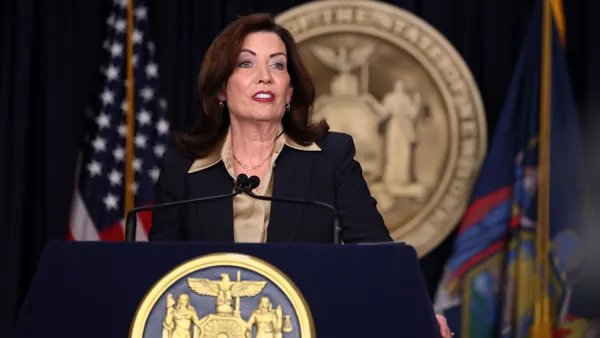Dive Brief:
- Lawmakers in the Massachusetts House have overwhelmingly approved a compromise bill that targets more wind and hydro power, but which fell short of the Senate's more aggressive proposal and did not expand on utilities' renewable portfolio standards.
- The final bill to come out of the conference committee was approved 157-1 by the House. It was stripped of a provision to prohibit electric utilities from charging customers to develop gas pipelines, over concerns the measure would put a damper on new generation in the region.
- While Gov. Charlie Baker is expected to sign the bill, critics called it "shortsighted" and expressed hope that some issues, like RPS expansions, would be revisited down the line.
Dive Insight:
While environmentalists and lawmakers appear broadly supportive of the compromise renewable bill, the final measure fell short of a Senate proposal and has some left green energy supporters already looking ahead to the next session.
"Energy is not a one-shot deal," Rep. Thomas Golden (D), chair of the House Committee on Telecommunications, Utilities and Energy, told MassLive.com. "I really, truly believe next year we'll be doing another energy bill, and the year after that we'll be doing another energy bill."
Under H. 4568, Massachusetts will seek long-term contracts for 1,600 MW of offshore wind power — the midpoint between the Senate's 2,000 MW plan, and the House's 1,200 MW proposal. The state will also seek 1,200 MW of hydropower or other renewables, rather than 1,500 MW in the Senate version.
Along with the wind and hydro mandates, the bill also included provisions directing the state to develop procurement targets for energy storage, push utilities to repair gas leaks, and expand energy efficiency projects for low-income residents, RTO Insider notes.
However, the bill did not expand on utilities' renewable portfolio standard, a disappointment for some lawmakers.
"That was the final give on the Senate's part, and it was no small give," Sen. Ben Downing (D), chair of the Committee on Telecommunications, Utilities and Energy, told MassLive. "I don't think that where we ended up is nearly as strong as where the Senate was."
Sen. Pat Jehlen (D) had supported an amendment that would block utilities from charging customers for the construction of new gas pipelines. "Massachusetts ratepayers should not be subsidizing the corporate bottom line," he said previously.
The amendment was not supported by Gov. Baker, however, and was not included in the final bill.
Also blocked from the final bill was the controversial Cape Wind project, according to the Recorder, when lawmakers adopted language preventing it from bidding for contracts under the new mandate. The 468 MW offshore wind project has been in limbo since two utilities canceled their power purchase agreements with the developer last year.
Even so, the bill's passage was hailed by offhsore wind developers as a breakthrough for the industry, which has struggled to get off the ground in the U.S. The country has only one offshore wind facility — the 30 MW Block Island project off Rhode Island, scheduled to go online this year.
The bill now heads to the governor, who is expected to sign it. Baker filed his own version of the bill last year and has said addressing the issue was one of his priorities in the summer session.












